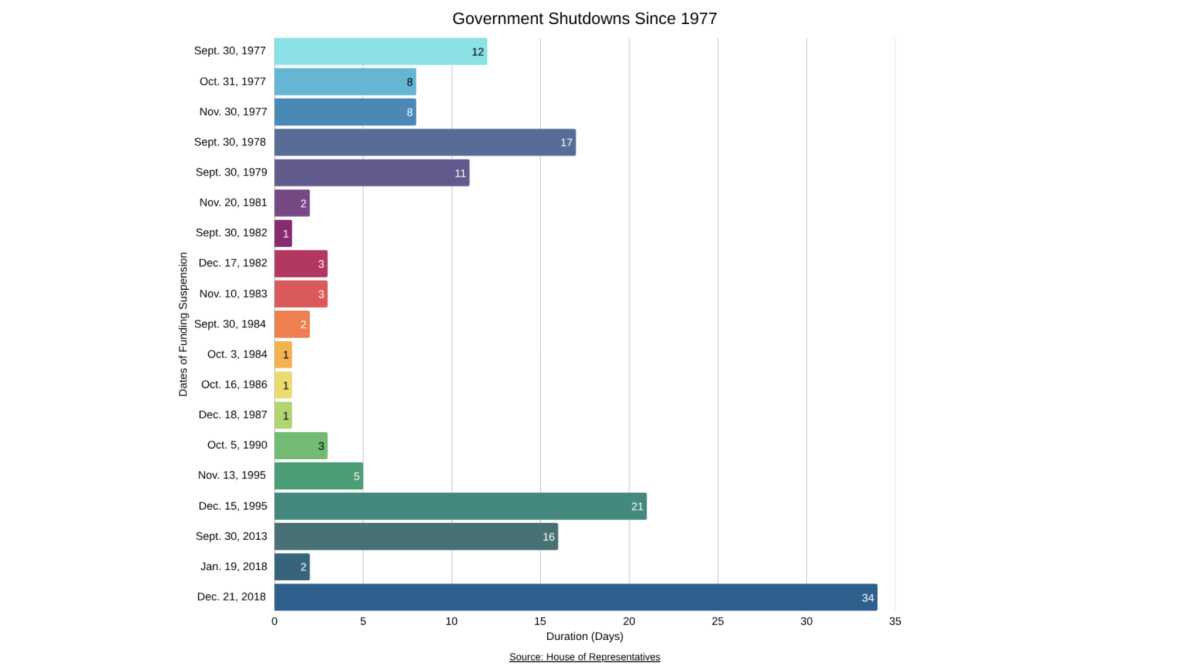On Sept. 30, Congress and President Trump failed to agree on federal government funding, leading to the temporary shutdown of non-essential government services.
A government shutdown occurs when both Congress and the President cannot agree on how to fund government programs for the year. These spending laws are referred to as “appropriations,” which provide federal agencies budget authority to spend funds. These funds are appropriated by the National Treasury with specific purposes such as paying government personnel and conducting research.
Congress typically passes appropriation bills that expire each year by Sept. 30. However, if no funding bills are passed by this date, the Antideficiency Act prohibits federal agencies from spending government funds without legal authorization.
Although the House passed a short-term spending bill called a “continuing resolution” or “CR,” the Senate failed to approve the CR.
Republicans hold 53-47 majority in the Senate, but still need the help of the Democrats to bypass a filibuster through a cloture, which requires 60 votes (three-fifths of the Senate.)
Republicans want to pass a CR which would give them seven more weeks to deliver detailed appropriations bills, while the Democrats refuse to agree to a CR unless Republicans appropriate more money to health care. More specifically, Democrats want funding to pay healthcare insurance premiums under the Affordable Care Act and for some Medicaid programs.
To further add to the conflict, Trump and White House budget director Russell Vought exercised their power to withhold funding from federal programs they opposed. This controversial suspension of funds is called an “impoundment” and has led to opposition from Democrats, who argue that impoundments are illegal under the Constitution as the appropriations clauses exclusively grant spending power to Congress.
Meanwhile, Republicans argue that Democrats are bypassing the normal process of passing appropriations bills in Congress by opposing a CR, disrupting the lives of federal employees and threatening government services.
Due to the lack of funding, non-essential federal employees are furloughed while personnel in vital government services continue working without pay. Once the budget is approved, federal employees will be paid back the money they didn’t receive while on leave.
The government shutdown will affect everyone, but it will uniquely affect our community at Meridian. According to the Northern Virginia Regional Commission, there are over 175,000 federal employees in Northern Virginia, and in the City of Falls Church, around 16.4% of its residents are employed by the government.
The president is using the shutdown to layoff even more federal employees, following the already extensive government reduction program. More than 4,000 workers will be laid off, with more cuts expected to take effect as the shutdown continues.
AP Government teacher Ms. Kelly Hill emphasized the toll the shutdown could take on citizens.
“We see the drama and the different party players blaming each other for the shutdown, but often when you get caught up in the drama, you forget that millions of people currently are unable to pay for their services and work they have been doing daily for the American good.”
Among other things, staffing shortages will affect health programs for the poor and elderly and cause travel delays at airports. Crucial medical research will stop, national parks may close, and long-term grants to public schools are in jeopardy. And, of course, federal employees will not be paid.
In the second week of the shutdown, Democrats and Republicans are still in disagreement about how the funds should be spent. More and more citizens, both locally and nationally, are feeling the effects of the government shutdown as important government programs remain closed. As the shutdown prevails, federal employees who rely on weekly paychecks to provide for their families continue to face challenges, yet only time will tell how and when the government shutdown will be resolved.









